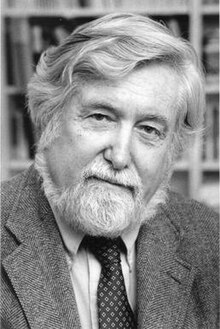
Back كليفورد جيرتز Arabic كليفورد جيرتز ARZ کلیفورد قیرتز AZB Клифърд Гиърц Bulgarian ক্লিফোর্ড গার্টস Bengali/Bangla Clifford Geertz Catalan Clifford Geertz Czech Clifford Geertz German Κλίφορντ Γκερτζ Greek Clifford Geertz Spanish
Clifford Geertz | |
|---|---|
 | |
| Born | August 23, 1926 San Francisco, California, U.S. |
| Died | October 30, 2006 (aged 80) Philadelphia, Pennsylvania, U.S. |
| Known for | Thick description Epochalism |
| Spouse | |
| Academic background | |
| Alma mater | Antioch College (BA) Harvard University (PhD) |
| Thesis | Religion in Modjokuto: A Study of Ritual Belief In A Complex Society (1956) |
| Doctoral advisor | Talcott Parsons |
| Influences | Talcott Parsons, Gilbert Ryle, Ludwig Wittgenstein, Max Weber, Paul Ricoeur, Alfred Schütz, Susanne Langer[1] |
| Academic work | |
| Discipline | Anthropology |
| School or tradition | Symbolic anthropology, Interpretive anthropology |
| Institutions | University of Chicago Institute for Advanced Study, Princeton, New Jersey |
| Doctoral students | Lawrence Rosen, Sherry Ortner, Paul Rabinow |
| Influenced | Stephen Greenblatt, Quentin Skinner |

| Part of a series on |
| Anthropology |
|---|
 |
Clifford James Geertz (/ɡɜːrts/ ; August 23, 1926 – October 30, 2006) was an American anthropologist who is remembered mostly for his strong support for and influence on the practice of symbolic anthropology and who was considered "for three decades... the single most influential cultural anthropologist in the United States."[2] He served until his death as professor emeritus at the Institute for Advanced Study, Princeton.
- ^ Martin, Michael (1994). Readings in the Philosophy of Social Science. MIT Press. p. 213. ISBN 0-262-13296-6.
- ^ Shweder, Richard A., and Byron Good, eds. 2005. Clifford Geertz by His Colleagues. Chicago: University of Chicago Press.